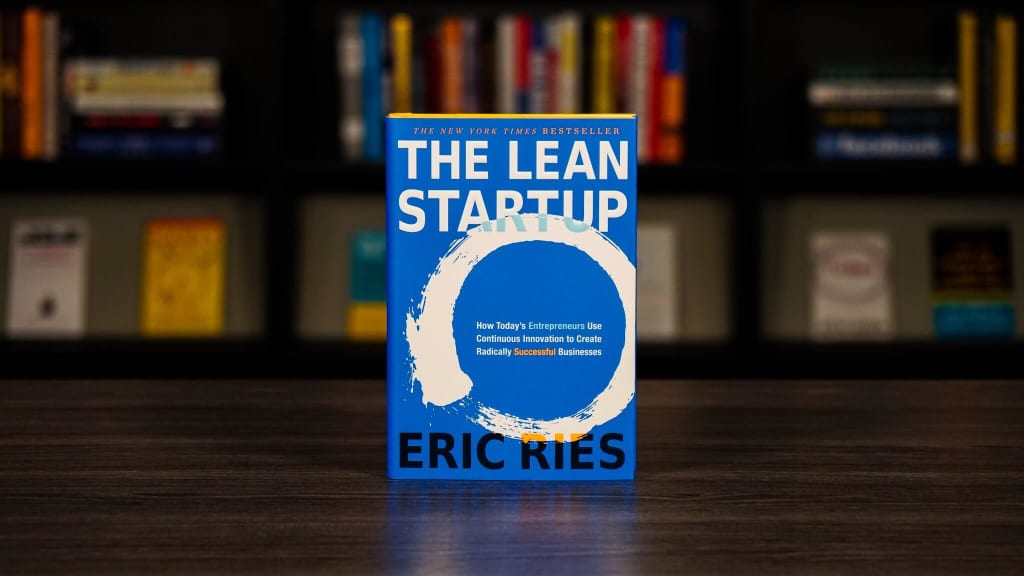"The Lean Startup by Eric Ries"
"Innovative Strategies for Building Successful Ventures"

"The Lean Startup" by Eric Ries is a groundbreaking book that has had a significant impact on the world of entrepreneurship and business management. Ries introduces a methodology and mindset that challenges traditional business approaches, advocating for a more efficient, flexible, and customer-focused way of building and scaling startups.
The core concept of the book revolves around the Build-Measure-Learn feedback loop, which emphasizes iterative development and learning from customer feedback. Ries argues that startups should focus on creating a minimum viable product (MVP) – a simplified version of their product with essential features – and then rapidly gather feedback from early adopters. This approach allows startups to test hypotheses, identify what works and what doesn't, and make informed decisions based on real data.
One of the key takeaways from the book is the importance of validating assumptions before investing significant time and resources. Ries encourages entrepreneurs to pivot (make strategic changes) or persevere (continue with the existing strategy) based on the insights gained from the feedback loop. This helps in avoiding wasted efforts on building something that may not resonate with the target audience.
Throughout the book, Ries provides numerous real-world examples and case studies from various industries to illustrate the principles of the lean startup methodology. He also discusses how these principles can be applied not only to startups but also to large organizations, promoting a culture of innovation and experimentation.
While "The Lean Startup" has been widely praised for its innovative approach to business, some critics argue that the methodology might not be universally applicable to all types of businesses or industries. Additionally, there can be challenges in implementing the lean startup approach in organizations with established processes and structures.
In summary, "The Lean Startup" is a must-read for aspiring entrepreneurs, business leaders, and anyone interested in innovation and business transformation. It offers a refreshing perspective on how to navigate the uncertain landscape of startups by focusing on customer feedback, continuous learning, and adapting strategies based on real-world data. Eric Ries' insights have had a profound influence on modern business practices, making this book a cornerstone in the field of entrepreneurship.
Certainly, here are the main points and key takeaways from "The Lean Startup" by Eric Ries:
Build-Measure-Learn Loop: The book introduces the core concept of the Build-Measure-Learn loop, which emphasizes creating a minimum viable product (MVP) to test assumptions, measuring its performance with real customers, and learning from the results.
Validated Learning: Ries stresses the importance of validated learning – using data and customer feedback to confirm or refute assumptions about a business idea before investing significant resources.
Pivot and Persevere: Entrepreneurs are encouraged to pivot (make strategic adjustments) or persevere (stick with the original strategy) based on insights gained from the feedback loop. Flexibility is key to adapting to market changes.
Minimum Viable Product (MVP): The MVP is a stripped-down version of a product that includes only essential features. It's designed to quickly test whether a product or idea resonates with customers, reducing the risk of building something that doesn't meet market needs.
Continuous Deployment: The lean startup methodology promotes continuous deployment and iteration, allowing for rapid adjustments based on real-world data and customer input.
Innovative Accounting: Traditional financial metrics may not be suitable for startups. Ries introduces the concept of "innovative accounting," where non-financial metrics like customer engagement, conversion rates, and retention are used to measure progress.
Actionable Metrics vs. Vanity Metrics: Focus on metrics that directly impact decision-making and growth, rather than vanity metrics that may look impressive but don't drive meaningful insights.
Start Small: Begin with a small-scale experiment to test hypotheses and gather data. Gradually scale up based on validated learning rather than assuming success from the start.
Continuous Deployment: The lean startup methodology promotes continuous deployment and iteration, allowing for rapid adjustments based on real-world data and customer input.
Applicability to Established Organizations: The principles of the lean startup can also be applied to larger, established companies to foster a culture of innovation, experimentation, and adaptation.
Lean Thinking: The book aligns with lean thinking principles, originally developed in manufacturing, by eliminating waste and optimizing processes to create value more efficiently.
Risk Reduction: By continuously testing and learning, startups can reduce the risk of building products that don't meet customer needs or failing due to lack of demand.
Fail Fast: Embrace failure as a learning opportunity. Failing fast and learning quickly from failures can lead to more informed and successful decisions in the long run.
Customer-Centric Approach: The lean startup methodology places the customer at the center of the development process, ensuring that products are designed to meet real customer needs.
These main points encapsulate the key concepts and takeaways from "The Lean Startup." The book offers a systematic approach to entrepreneurship that emphasizes agility, learning, and customer-focused innovation.
In conclusion, "The Lean Startup" by Eric Ries presents a transformative framework that has reshaped the landscape of entrepreneurship and business innovation. The book's key takeaway lies in its emphasis on agility, continuous learning, and customer-centricity as essential drivers of success in today's rapidly evolving markets.
Ries' Build-Measure-Learn feedback loop challenges traditional business practices, advocating for a leaner, more iterative approach to product development. By encouraging entrepreneurs to embrace validated learning and prioritize actionable metrics over vanity measurements, the book guides readers toward making informed decisions and avoiding wasted efforts.
The notion of a Minimum Viable Product (MVP) stands as a pivotal concept, allowing startups to test assumptions and gather invaluable customer feedback without overcommitting resources. The acceptance of failure as a stepping stone to success encourages a culture of experimentation and resilience, underlining the importance of pivoting or persevering based on real-world insights.
"The Lean Startup" isn't confined to startups alone; its principles resonate with established organizations seeking to inject innovation into their DNA. Through a blend of real-world examples and insightful case studies, the book demonstrates how a lean approach can foster innovation, reduce risk, and cultivate a deeper understanding of customer needs.
In a world defined by uncertainty and disruption, "The Lean Startup" provides a roadmap for navigating these challenges, redefining how entrepreneurs, business leaders, and innovators approach their journeys. By offering a dynamic framework grounded in practicality, adaptability, and learning, Eric Ries has left an indelible mark on the business world, inspiring a generation to rethink, reinvent, and reimagine the way we create and grow successful enterprises.
About the Creator
eBook Basket
Knowledge is everywhere






Comments
There are no comments for this story
Be the first to respond and start the conversation.